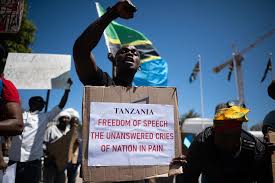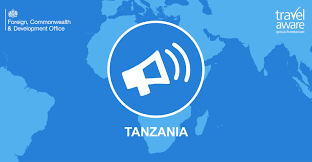Tanzania's Tragic Silence: Thousands Dead, Demands for Transparency Erupt

In the aftermath of what is described as Tanzania's bloodiest election, figures suggest a mass political killing, yet an alarming silence pervades the international community. Protests erupted nationwide, from Dar es Salaam to Mwanza, Mbeya, and Arusha, met with swift, coordinated, and deliberately violent responses from security forces. The absence of foreign journalists and the restriction of international election observers have contributed to the obscured truth of these events.
Witnesses report that security forces removed corpses from public streets before dawn, loading them onto military trucks and transporting them to undisclosed locations. Lawyers and clergy speak of entire neighborhoods where whispers of mass graves are now common. Despite the pervasive fear, an outline of the horrific toll is emerging. Medical associations and legal human rights groups have confirmed at least 3,500 deaths through direct access to morgues, burial registers, and hospital records, with 800 bodies counted in Dar es Salaam alone. Additionally, families and community networks report another 6,500 individuals missing, last seen being taken by police or intelligence units during the demonstrations.
Beyond the sheer scale of the killings, the apparent intent behind the violence is deeply disturbing. Eyewitness accounts suggest that security forces were not merely trying to disperse protests but were actively aiming to instill a lesson in fear. This lesson served as a stark warning against any future challenges to the 63-year rule of the Chama Cha Mapinduzi (CCM), one of the world's longest unbroken political monopolies. President Samia Suluhu Hassan, who was declared the winner with an implausibly inflated 97 percent of the vote, vehemently denies these casualty figures, attributing them to "foreign agitators," "paid activists," and the opposition staging their own deaths – a defense dismissed as incredible when the state resorts to denying the existence of bodies to justify violence.
The straightforward solution to address potential exaggerations or inaccuracies in these numbers is an independent international investigation. UN High Commissioner for Human Rights Volker Türk has already called for such an inquiry, a demand echoed by Tanzanian human rights lawyers, religious leaders, and the families of the missing. However, this critical call has not been met with any substantial pressure from major diplomatic players. China, with decades of heavy investment and Tanzania serving as a significant ideological export site for the CCP, prioritizes centralized control. The United States, eyeing Tanzania's nickel, cobalt, graphite, and rare earths crucial for the energy transition, has seemingly set aside concerns for democracy and human rights in Africa. The United Arab Emirates, deeply embedded in Tanzanian logistics, aviation, and energy, is similarly not known for intervening against state repression where commercial interests are at stake. Even South Africa, which took Israel to the International Court of Justice, has remained silent, its historical ties with Tanzania during the liberation struggle seemingly leading to an emotional paralysis.
This collective political blackout means that if thousands of Tanzanians are dead, the world is not merely dealing with a contested election but a crime against humanity, as defined by the African Charter, the UN Human Rights Covenant, and the Rome Statute. This issue demands African accountability. The African Union Peace and Security Council possesses the authority to call for a Commission of Inquiry, SADC bears the responsibility to prevent regional destabilization, and the East African Community cannot ignore the collapse of civic trust in its second-largest member. African civil society, including churches and professional associations, must actively resist the normalization of this violence.
This current state contrasts sharply with the legacy of Tanzania's founding father, Julius Nyerere, who believed political power required moral discipline, governance was a trust, unity was built through persuasion, and leadership meant service. He could not have imagined a victory stained with blood on the pavement. If this violence remains unchallenged, it will persist, leaving Tanzanians who have shown an unwillingness to be silenced with only subjugation as an option. Tanzania, a nation celebrated for its natural beauty, diverse cultures, and a history of peaceful political disagreement, now faces the risk of losing this fundamental aspect of its identity. The only route out of this political cul-de-sac is genuine dialogue with all Tanzanian representatives, including opposition leader Tundu Lissu, whose imprisonment for advocating electoral reform reflects the suppression that could have averted this tragedy. Mass graves, if they exist, must be opened; silence is no longer an option.
You may also like...
Super Eagles Fury! Coach Eric Chelle Slammed Over Shocking $130K Salary Demand!
)
Super Eagles head coach Eric Chelle's demands for a $130,000 monthly salary and extensive benefits have ignited a major ...
Premier League Immortal! James Milner Shatters Appearance Record, Klopp Hails Legend!

Football icon James Milner has surpassed Gareth Barry's Premier League appearance record, making his 654th outing at age...
Starfleet Shockwave: Fans Missed Key Detail in 'Deep Space Nine' Icon's 'Starfleet Academy' Return!

Starfleet Academy's latest episode features the long-awaited return of Jake Sisko, honoring his legendary father, Captai...
Rhaenyra's Destiny: 'House of the Dragon' Hints at Shocking Game of Thrones Finale Twist!

The 'House of the Dragon' Season 3 teaser hints at a dark path for Rhaenyra, suggesting she may descend into madness. He...
Amidah Lateef Unveils Shocking Truth About Nigerian University Hostel Crisis!

Many university students are forced to live off-campus due to limited hostel spaces, facing daily commutes, financial bu...
African Development Soars: Eswatini Hails Ethiopia's Ambitious Mega Projects

The Kingdom of Eswatini has lauded Ethiopia's significant strides in large-scale development projects, particularly high...
West African Tensions Mount: Ghana Drags Togo to Arbitration Over Maritime Borders

Ghana has initiated international arbitration under UNCLOS to settle its long-standing maritime boundary dispute with To...
Indian AI Arena Ignites: Sarvam Unleashes Indus AI Chat App in Fierce Market Battle

Sarvam, an Indian AI startup, has launched its Indus chat app, powered by its 105-billion-parameter large language model...


